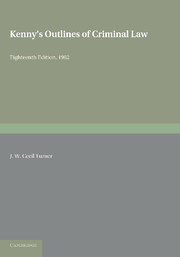Book contents
- Frontmatter
- Preface to the Sixteenth Edition
- Preface to The Seventeenth Edition
- Preface to the Eighteenth Edition
- Contents
- Index of cases
- Index to the principal statutes
- List of principal books cited
- BOOK I GENERAL CONSIDERATIONS
- BOOK II DEFINITIONS OF PARTICULAR CRIMES
- BOOK III MODES OF JUDICIAL PROOF
- BOOK IV CRIMINAL PROCEDURE
- CHAPTER XXIX LIMITATIONS ON CRIMINAL JURISDICTION
- CHAPTER XXX CRIMINAL COURTS
- CHAPTER XXXI SUMMARY PROCEDURE
- CHAPTER XXXII ORDINARY PROCEDURE
- CHAPTER XXXIII ORDINARY PROCEDURE
- CHAPTER XXXIV ORDINARY PROCEDURE
- Appendix I The meaning of ‘credit’
- Appendix II II Rules as to admission of evidence which reveals to the jury facts discreditable to the person accused
- Appendix III III Forms of indictment
- Index
CHAPTER XXXIII - ORDINARY PROCEDURE
from BOOK IV - CRIMINAL PROCEDURE
Published online by Cambridge University Press: 05 June 2016
- Frontmatter
- Preface to the Sixteenth Edition
- Preface to The Seventeenth Edition
- Preface to the Eighteenth Edition
- Contents
- Index of cases
- Index to the principal statutes
- List of principal books cited
- BOOK I GENERAL CONSIDERATIONS
- BOOK II DEFINITIONS OF PARTICULAR CRIMES
- BOOK III MODES OF JUDICIAL PROOF
- BOOK IV CRIMINAL PROCEDURE
- CHAPTER XXIX LIMITATIONS ON CRIMINAL JURISDICTION
- CHAPTER XXX CRIMINAL COURTS
- CHAPTER XXXI SUMMARY PROCEDURE
- CHAPTER XXXII ORDINARY PROCEDURE
- CHAPTER XXXIII ORDINARY PROCEDURE
- CHAPTER XXXIV ORDINARY PROCEDURE
- Appendix I The meaning of ‘credit’
- Appendix II II Rules as to admission of evidence which reveals to the jury facts discreditable to the person accused
- Appendix III III Forms of indictment
- Index
Summary
Section I. Prosecution
The process of commitment by a justice of the peace which we have described, though in actual practice it is adopted in almost every instance, is not legally essential for bringing an accused person to trial before a jury. All that is truly essential is some mode of ‘prosecution’, i.e. of formal accusation. Such an accusation may be made either by a Crown official's information, or by an indictment or in the case of murder, manslaughter or infanticide by a coroner's inquisition.
BY INFORMATION
An information is a written complaint made on behalf of the
Crown by one of its officers and filed in the Queen's Bench Division. Since such a mode of accusation dispenses with any accusing jury, and with any examination before a justice of the peace, it is only allowed in cases of misdemeanour. Since 1938 the Attorney-General is the only officer who has this right, ex officio, which he may exercise at his own discretion (but seldom does so).
BY INDICTMENT
A bill of indictment is a written accusation of crime.4 Practically every case that comes to a petty jury for trial comes on indictment. A bill of indictment may be preferred (i) when the person charged has been committed for trials Or (ii) under the direction or with the consent of a judge of the High Court,6 or (iii) in the case of perjury by order of a judge or magistrate who is of opinion that in the course of any proceeding before himself any person has been guilty of perjury. A bill of indictment may be preferred by any person and, if satisfied that any of the above three requirements has been fulfilled, the proper officer of the court before which the bill is preferred signs the bill which thereupon becomes an indictment. The judge or chairman of the court, if satisfied that any of the above three requirements has been fulfilled, may of his own morion or on the application of the prosecution direct the bill to be signed.
- Type
- Chapter
- Information
- Kenny's Outlines of Criminal Law , pp. 576 - 619Publisher: Cambridge University PressPrint publication year: 2013



